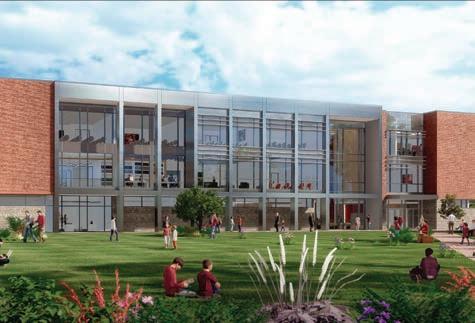
12 minute read
The new Upper School Humanities building is taking shape on campus
The Humanities: Pedagogy with Purpose
by Christina Mimms,
MANAGING EDITOR
Humanities classes at Holy Innocents’ Episcopal School serve as the setting for some of the great lessons in education: exploring the stories of tragic heroes in great works of literature, debating issues of ethics and behaviors, questioning and affirming one’s belief systems, delving into not just world languages but world cultures, and learning to discuss and pen all with clarity and purpose. Conversations that take place in these classes may well remain in students’ minds for the rest of their lives where they will draw from those lessons time and again. With the current issues of a global pandemic as well as social change stemming from the Black Lives Matter movement, there is much to discuss. Teachers and students are conversing about issues with a worldwide impact while also experiencing them. It is a meaningful place to pause, and HIES provides the solid and safe place for those discussions, guided by highly qualified teachers who lead students on a fruitful path where opinions may collide, but without running off course and away from purpose. ENGLISH In his 24 years teaching English at HIES, Chris Swann, Ph.D., is one who has observed and implemented changes, but also borne witness to things that have remained the same. “Reading and writing are crucial skills for college but also for life,” he said. “I’ve had students tell me they felt really prepared for writing in college, which gives them a leg up.” In the English department, students are grouped by grade level. That configuration allows discussions to take place among direct peers. With that, Dr. Swann and other faculty regularly review their reading lists, and for AP classes, they look at reading recommendations from the AP College Board. “We’re always looking for newer titles that speak to kids today,” he said. “It’s easy to get locked into teaching this grade and this book, but we ask, ‘Why?’. We look at how books apply in the real world because we want to send off students equipped to deal with some of the uglier things as well as the good things. Literary texts can often reinforce or challenge
dominant ideologies. English class is a great, and economic issues. “We have a fragile safe place to encounter material and discuss it.” economy – more than we realized – and we For example, reflecting on Black Lives Matter, which garnered more attention than ever in summer 2020, teachers changed the ninth-grade summer reading book to “The Hate U Give” by Angie THERE took democracy for granted,” Dr. Koontz said. “The amazing thing is that this woke people up to be informed and to participate. It’s all happened so quickly.” Current events opened the ARE Thomas, which tells about the police shooting of Oscar Grant, a young Black man in SOME AMAZING LESSONS ABOUT door for some of the new elective classes to respond. For example, in History of Oakland, Calif. AP English RESLIENCY, Rock n Roll, students have Literature classes read and discussed “An American Marriage,” a story about a COURAGE AND TENACITY. learned about the role of protest songs. Dr. Koontz is considering adding a Social biracial marriage by Tayari -Erik Vincent Justice elective that would Jones. allow for a deeper dive into “Black Lives Matter has pushed us to examine Black Lives Matter. the diversity of what we teach,” Dr. Swann said. “Issues have come up and there have been RELIGION good discussions.” While religion is, and always has been, an integral part of the humanities curriculum, Classes have not discussed the pandemic more in Upper School, students move beyond the than anecdotally because “no one’s writing the key players in the Bible and dive into serious COVID novel right now,” Dr. Swann said. In issues, including taking a look at religions a few years, material may exist that is worth around the world – those that differ from considering. Christianity and some whose tenets are HISTORY difficult to understand. That is also the case for History classes. With the pandemic still in the present, not as many resources abound for classwork. However, in a new elective called History of Medicine, students have studied the history of disease. In the spring 2020 semester, COVID-19 raised a lot of questions among students, and religion classes proved to be a safe place for students to feel emotional support. “As a department we saw our role as caretakers and that felt more important than getting through “We have a confluence of three historical some content,” Mary Bingham, religion events happening at the same time – the department chair, said. “This semester we’re pandemic, Black Lives Matter and the still taking time to check in with everyone and election,” Laurel Koontz, Ph.D. history chair, see how they are feeling. We want to make said. “It’s the perfect storm.” sure everyone feels supported and valued.” Many issues have come to light and served as The tenets behind the Black Lives Matter fodder for rich discussions. In U.S. History, movement – inclusivity, dignity, equality for example, students have taken a closer – connect with Episcopal ideals as well as look at democracy, rights, protests, health Christianity, creating content for important insurance, testing, vaccines, healthcare failures discussions in World Religions and other
classes. For example, in Mrs. Bingham’s senior elective “Ethical Responses to the Nazi Regime,” students have drawn parallels between Nazism and treatment of Black citizens and minority groups.
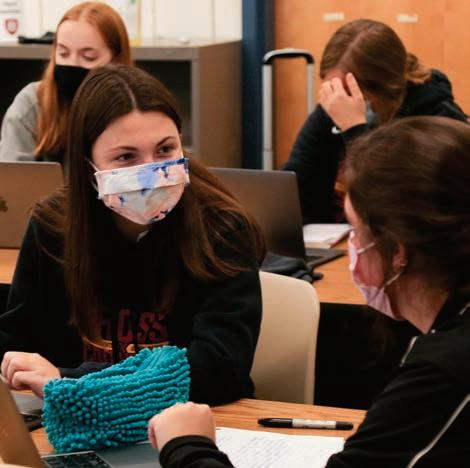
WORLD LANGUAGES World Language classes study not only the language but also the culture of other countries. As students quarantined last spring they were naturally curious about how others were affected by the global pandemic. James Terry, Ph.D., world languages department chair, researched articles about Paris in lockdown. Students were shocked to learn that residents had to have documentation to leave their homes and were permitted limited time outside. The vast metro system closed completely. Using current events as lessons has proven to be an effective technique for students to learn with understanding – and even empathy – about their subject matter. “We try to teach language using topics that compel students,” Dr. Terry said. Storytelling is another effective method that aids with proficiency as well as the expectation for students to speak the language at least 70 percent of class time. One student starts telling a story and then hands off to another student to add to the story which travels around the room and to the remote learners on iPads. Storytelling allows every student to participate and gives them an opportunity to be creative as well. From primary grades onward, HIES world language teachers generally avoid grammarbased instruction and focus on vocabulary, comprehension and proficiency, including pronunciation. Students are assessed on their ability to speak the language. Because maskwearing has slightly prohibited their ability to project, assignments often require students to record videos of themselves at home in which they respond to a series of questions from their teachers.
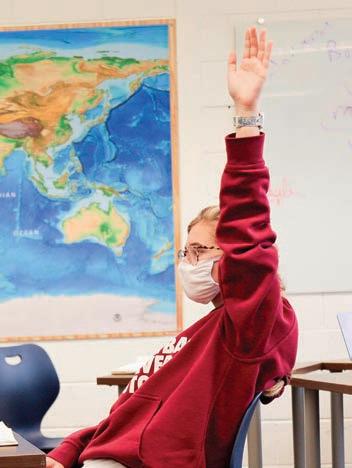
GLOBAL STUDIES The year 2020 may impact Global Studies more than any of the humanities classes. International trips were canceled, begging the question of how to create global experiences for students and how to connect with exchange partners in Ghana and France as well as Asahigaoka High School, HIES’ sister school in Sapporo, Japan. Those relationships have been nurtured for many years and preserving them is a priority even as new opportunities are considered. “With so much in flux, this is a good time to pause and reflect on our global initiatives,” Erik Vincent, humanities and global studies curriculum director, said.
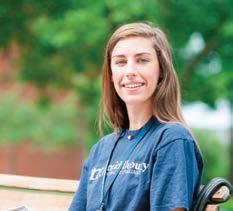
When Isabelle Smith ’17entered Holy Innocents’ Upper School, she knew the Global Studies program would fit her perfectly. Her family always enjoyed international travel and the opportunities offered by HIES allowed her to expand her education well beyond the campus. “Global was really formational for me in my HIES experience,” she said. “The capstone project was an opportunity to connect with the Atlanta community in a new way.” It also inspired her to look for experiences outside of Atlanta. In the summer after her sophomore year, Isabelle traveled to Guadalupe with Broadreach, a national organization that coordinates trips for middle and high school students. Isabelle learned about Creole culture and practiced French on her adventure. In the summer after her junior year, she participated in Middlebury College’s four-week language immersion program for intense French studies. Friends she made there were involved with the Global Studies programs at their respective schools as well, giving them much to discuss outside of class. When the time came to select a college, Isabelle needed a school that allowed international travel opportunities but she also wanted one with small classes and a strong liberal arts program. Colorado College fit the bill. Isabelle is majoring in political science with a French minor and enjoys skiing as time permits. She spent the majority of her junior year in France studying at the political science institute where she attended classes with students from France as well as South America. She traveled throughout France until her time was cut short by COVID-19 quarantine. Isabelle returned home in March and completed her classes online. Currently Isabelle is back at Colorado College and in the process of applying for a Fulbright scholarship. Her proposal is focusing on research in Senegal and the role of female representatives in political systems. After college, she is considering working in nonprofits but serving her community remains a priority — a lesson learned at HIES. “As you start to form your own thoughts and beliefs in high school, Global created the environment and tools to engage in conversations in a productive way,” Isabelle said. “Students learn to respect each other and how to be effective global citizens. It gave me a confidence I wouldn’t have had and it was an amazing experience for me.” New in his role for the 2020-2021 school year, Mr. Vincent is allotting time to meet with his faculty to brainstorm ideas, including ways to leverage technology to create virtual exchange opportunities for students in the middle and lower grades even as he works with PK3-12 humanities faculty to align curricula vertically and with larger global competencies. “This is a critical time to be teaching humanities with a pandemic, Black Lives Matter, economic uncertainty and the election,” Mr. Vincent said. “The situation presented to us as educators is significant. These are globally shared experiences but lived out differently in different parts of the world. The ‘world as classroom’ has taken on new meaning for us.” With that, faculty are seeking ways to interact virtually with the Round Square schools with online learning programs and conversations. Virtual programs will allow Middle School students, who have not traveled as much as Upper School students in the past, to start building relationships with international peers. “There is so much more that we can do besides hosting trips and sending students on trips,” Mr. Vincent said. Opportunities for dialogues and debates exist for students, who can compare and contrast their pandemic experiences with students in other countries. Dialogue is a key component of Round Square programs; 2020 is a great year to start building that skill. “Overall, there are some amazing lessons our students can teach us about resiliency, courage and tenacity during these extraordinary times,” Mr. Vincent said. And while humanities classes at HIES are comprised of rich literature, impactful religious tenets, vast historical knowledge, foreign language proficiency and cultural competency, a HIES education would not be complete, particularly in 2020, without lessons in the very qualities of humanity such as empathy, dignity, faith. These classes embody the school mission statement to develop “a love of learning, respect for self and others, faith in God, and a sense of service to the world community.”
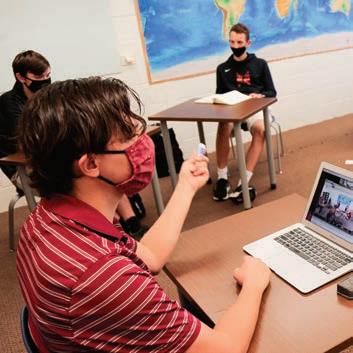
Design features of the new Upper School Humanities building will provide not only more physical space for students but a better arrangement for the robust conversations happening in the classes. In the new classrooms, Dr. Chris Swann believes his faculty will be better equipped to teach an already outstanding program with more physical space, modern design and equipment, and flexibility. For example, many Upper School desks purchased years ago were not designed for laptop computers that today’s students use constantly. The tight quarters allow only one classroom arrangement, while the new classrooms will have ample space so that desks and tables can be moved into one configuration for discussions or group work and into a different configuration for a test. Collaborating among colleagues ranks top on the goals for the humanities curriculum. Where topics overlap, the reasoning for putting two classes together or assigning a joint project between history and English not only provides students with an opportunity to collaborate but also deepens their thinking. Dr. Laurel Koontz hopes to integrate more group work with English and religion classes. To date, combining classes and collaborative work have been challenged by a lack of space in both the Riley and Groesbeck buildings. Students end up sitting on the floor in classrooms or in the hallways without proper surfaces for laptops, books or notes. HIES’ new humanities building will hold intentionally designed spaces that will be able to accommodate large groups of students in meeting spaces as well as small groups that can work in nooks that will be tucked into different areas of the building. Mary Bingham is very excited to get a Harkness table in her religion classroom, where students will be seated around an oval table which has been proven in research to encourage open conversations. A teacher serves as a guide but students are on equal footing and can freely participate in discussions. In the 2019-2020 academic year James Terry, Ph.D., world languages department chair, was able to conduct some of his classes outside, which he found beneficial for his students. The new building incorporates a great deal of natural light, which mimics the feeling of being outside, thus reducing stress and allowing students to learn in a more comfortable state. “I’m excited about the openness of the classrooms,” he said. Spanish teacher Patrick Allegra looks forward to the enhancements that will be included in the new building. “It will be great to have communal spaces and flexible teaching options,” he said. “We will also be able to be more intentional about how we interact with the Global curriculum, for example.” Space to move, to create, to collaborate and to realize potential all will benefit the humanities program. The new structure also will house college counseling offices and the campus shop.
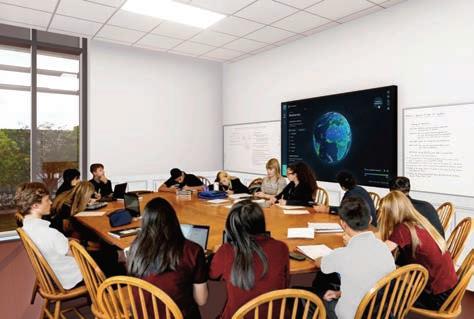

THE NEW STATE-OF-THE-ART HUMANITIES BUILDING IS SET TO OPEN FALL OF 2021.
